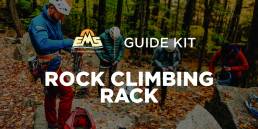The school year is over and with it goes your kid’s six-hours-a-day babysitter. Thankfully, you’ve got something else lined up, both to occupy their time and give them a valuable experience: Your child is going to camp! You’re either nervous to see your little one become more independent or excited to have a few hours, days, or weeks of parental freedom. Whichever the case, you could probably use a little guidance when it comes to getting them ready.

Preparing for Camp
1. Read the Handbook
First, read the parent handbook. Every camp has one, but not every parent reads it. Most camps answer hundreds, if not thousands, of parents’ questions in emails, phone calls, and Facebook posts, so there’s a good chance they’ve heard yours before. A good camp will pay attention to the questions coming in, identify the most common ones, and answer them in the camp’s handbook or in their website’s FAQ section.
2. Discuss Health Issues
The best reason to contact the camp before your child arrives is to discuss any health issues. If your child has a medical condition, mental health matter, dietary restriction, or something similar, don’t hesitate to reach out to the office.
Believe it or not, some people actually try to hide this stuff, because they’re worried that, if the camp knows their child has ADHD, is a vegan, or takes medication for depression, they will turn their child away. This couldn’t be further from the truth. Camps want children to succeed, and campers have the best chance when the camp and parents work together. Rather than withhold information, do your best to share everything the counselors and support staff can use to encourage your child’s success.
3. Share Your Thoughts
Lastly, it’s a good practice to think about two questions: One, what excites you most about your child’s camp experience, and two, what are you most worried about? Quietly pull your child’s counselor aside to share those thoughts while your child is unpacking or talking to a friend.
After working with over 400 college-aged counselors, I can tell you that they’re all in competition to be the best. They will eat up any information that helps them provide their campers with a positive, life-changing experience.

What to Bring to Day Camp
Day campers should arrive wearing comfortable, weather-appropriate clothing—shorts, T-shirts, and either sneakers or other closed-toe shoes—and have a pair of water shoes or sandals ready for water activities. I recommend bringing a backpack with the following items:
- Refillable water bottle
- Bathing suit (one-piece or athletic type for girls)
- Beach towel
- Change of clothes
- Rain gear (boys or girls)
- Sunscreen (non-aerosol)
- Insect repellent (non-aerosol)
- Hat
- Nut-free lunch and snack (depending on what the camp provides)

What to Pack for Overnight Camp
Each overnight camp offers different activities. So, as a starting place, this general list can be customized to the uniqueness of your child’s camp:
Clothing
- Shorts (2-4 pairs)
- Jeans/long pants (2 pairs)
- T-shirts (6)
- Sneakers
- Sandals with a heel strap
- Socks and underwear (7 pairs)
- Pajamas
- Jacket or sweatshirt (boys or girls)
- Raincoat or poncho (boys or girls)
- Bathing suit (2)
Toiletries (Unscented)
- Bath towel
- Beach towel
- Washcloth
- Soap in a box (or Dr. Bronner’s)
- Toothbrush and paste
- Shampoo
- Deodorant
- Comb or brush
Camp Life Items
- Sleeping bag or bedding (twin size)
- Pillow
- Headlamp or flashlight with extra batteries
- Water bottle or hydration pack
- Bag for dirty clothes
- Insect repellent (non-aerosol)
- Sunscreen (non-aerosol)
- Optional: Games and toys
- Optional: Hammock or camp chair
Don’t worry too much, though. Your child will have a blast whether or not you remember to pack each and every item listed. Camp is a community, and folks tend to band together, so whether it be the health center, counselor, or your child’s new best friend, plenty of people have their back. So, relax, and get ready to hear “one time at camp” stories for the next nine months.
Christopher Colahan
Chris was born and raised in the Philly suburbs, but don’t hold that against him. He learned outdoor skills at Camp Kawanhee for Boys in Weld, ME. In college he became an EMT, joined the Shawnee Mtn Ski Patrol, and founded the Villanova Adventure Group. After college he lived in Japan for 2 years, running a scuba tour operation in Sata-Misaki, climbed Japan’s 5 tallest peaks, and surfed across SE Asia. After grad school Chris taught in The Bahamas for a year, and went on to lead Peconic Dunes 4-H Camp for 9 years, launching a teen wilderness trips program. Nowadays Chris continues to surf in Rhode Island, backpack in New Hampshire, canoe in Maine, and mountain bike with the EMS crew in Connecticut.




